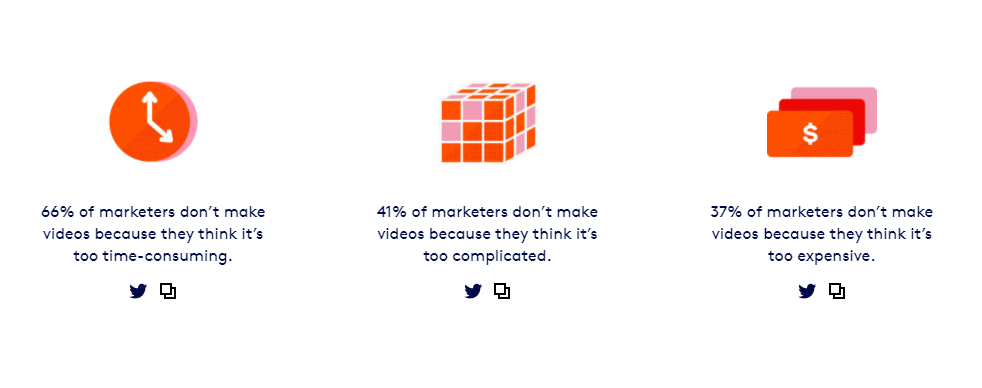What Businesses Need to Know: The Cost of Video Production
As part of our new VidOps blog series, What Businesses Need to Know, we’re drawing back the curtain for a transparent look at how video production works for commercial businesses. This week: the cost of video production.

With numbers increasing globally every day, if you’re not generating video content, it’s time to face it - you’re behind. That said, there’s still a big pool of marketers who aren’t. For the sake of this article, we’ll be focusing on the 37% who believe video production is too expensive.
Video content is one of the quickest and most effective ways to grow your business. This isn’t a base claim, there are endless statistics to prove it - it's been found that 87% of video marketers report that video has increased traffic to their website.
Couple that with some staggering usage data:
- Youtube has 24,200,000 live subscribers (according to Social Blade)
- Facebook has over 8 billion video views a day (Tech Crunch).
And it’s clear to see the impact. With numbers increasing globally every day, if you’re not generating video content, it’s time to face it - you’re behind.
With that said, there’s still a big pool of marketers who aren’t. This can be down to a number of factors, but for the sake of this article, we’ll be focusing on the 37% who believe video production is too expensive.

It can be difficult to actually plan and produce content if estimates are constantly changing. Expense may account for the fact that only 17% of marketers are outsourcing their video production to a content creation agency.
Can I Produce My Own Content for Less?
Many companies will take cost as a cue to begin producing low-quality video content, and producing huge amounts of video content for the lowest budget to keep costs down.
Whilst there’s no issue with this in theory, in reality, it often backfires.
Video content has one of the highest rates of ROI (return on investment) in digital marketing, and frequently outshines SEO and Ad Words. But consumers are becoming more and more discerning in what persuades them.
You’re competing with constant content, big corporations, and low attention spans. For your video to really showcase your brand and generate the results you want to see, it needs to speak directly to your target audience, and it turns out that low-quality just doesn’t cut it.
The Data on the ROI of Low-Quality Video
BrightCove published survey findings with some alarming results: 62% of people will develop a negative impression of your brand from poor-quality video content. 23% will hesitate to purchase from that brand and 60% will be dissuaded from even engaging with that brand on social media - scary, huh?

It’s clear to see that cutting costs on production, may actually prove more harmful in the long run. A high-quality video, utilising appropriate visual storytelling can be the difference between grabbing a potential customer or losing one.
To summarise? You get what you pay for.
Can I Keep Costs Down by Producing in-House?
Let’s say you’ve already nixed this idea. You decide to create fewer, higher-quality videos, but still want to keep costs as low as you can.
Perhaps you’ll take it upon yourself to produce internally? Source your own creatives and production team?
Again, in theory, not a bad idea. But this is where the expense can begin to stack up.
Many businesses begin this process with limited budgets and can find themselves over faced with the work involved, and the additional costs that come with video production.
To illustrate this, we decided to collate some of the numbers and see just how much it can actually cost a business to deliver high-quality video content.
These costs come from a nationwide average day rate in the industry, at the union level. Bear in mind that production is a consultative process, and prices can and will differ, depending on who you consult.
Average Costs
Conceptual work - £500 a day
To take your video from concept to reality, there’s some leg work involved. Conceptual work is key to a successful and efficient production shoot. This includes storyboards to effectively plot out the look and shots required for your video. If you don’t’ have a fully-fledged concept ready to support your strategy, this process can take longer than you’d expect.
Script Writer - £400 a day
Don’t have a script? If you want one you’ll usually have to pay for it. Many companies offer a combined cost for script and concept development, but you’re looking at a higher combined cost.
This is one of the simplest places to cut costs - a staff member could write the script, but bear in mind that it may be time-consuming, and you need to be assured of the quality of the work.
Location - £300 – £5,000
Chances are that you may simply want to use your office as the location for your video - as is the case for most corporate videos.
However, if you want to film externally you might come up against permission fees, specialist lighting, and sounds, security hire, and additional facilities including toilets.
If you want to hire a purpose studio you can often get reasonable rates, but each studio has its own stipulations and terms of use, as well as the possibility of incurring additional fees.
Equipment - £500 – £10,000
A camera is non-negotiable, of course! And practically every shoot will also require basic lighting, sound rigging, and memory cards.
The quality and scope of each piece of equipment should also be taken into account. Do you really need the newest, highest spec cameras? Or will an older model suffice?
You may find that some crew members come with their own equipment, but you can expect to pay for the convenience.
You’ll possibly need to consider travel costs on top. Need to Uber your crew and equipment? Factor it in.
It’s also worth establishing whether there are insurance costs with your equipment hire, as this is critical to protect your shoot and your business, but can incur extra payments.
Crew Hire
Who you need in your crew is very dependent on the style of your video, the environment you’re in, and the complexity of the shoot. You may only need a very small basic crew (1 Director, 1 Camera Op), or you may need to scale up.
For example, if you require a drone shot, you’ll need to hire a Drone Operator to operate the drone and the camera attached. But it’s not a critical role to film a basic video.
You’ll also need to take experience and expertise into account. If you need a top-level director, you will be looking at top-range prices.
Not all of these roles are crucial to every shoot, and it’s worth doing some research into the skills of each crew member to be sure of what you need.
|
Crew Member
|
Role
|
Day Rate
|
|
Director
|
Has control over all creative elements. Directs performers and shots, controls the set.
|
£650-£2,000
|
|
Director of Photography (DOP)
|
The head of the camera department, the DOP works with the director to style the ‘look’ of the video
|
£650-£2,000
|
|
Camera Operator
|
Responsible for the actual filming, as per storyboards and direction.
|
£450+
|
|
1st Assistant Director (AD)
|
Defines schedule, and is the go-between for each department.
|
£250+
|
|
Video Editor
|
Watches, cuts, and places together all the footage from the shoot to create the final video.
|
£400 – £1,000
|
|
Sound Technician
|
Also known as Sound Recordists, Sound Technicians are responsible for recording and mixing all the sound on set.
|
£300 – £700
|
|
Gaffer
|
Heads up electrical department; responsible for all the lighting on the production.
|
£300 – £600
|
|
Grip
|
Builds and looks after the equipment supporting the cameras.
|
£200 – £600
|
Actors - £400
Many corporate videos don’t require actors - you’re showcasing your brand! Why not showcase your colleagues as well? But again, this is entirely dependent on the type of video, and the vision behind the concept.
If you are intending to use actors, you’ll need to factor in the extra cost, as well as the time allotted for casting and even rehearsals.
Voiceover - £150-£300
Maybe you didn’t use any actors, but you still want a professional voiceover to round off your video. It’s a great idea and can be greatly effective in selling your narrative, but obviously comes with a price tag.
Most voiceover artists work from their own studios so you won’t need to pay extra for another studio or recording equipment, but this is often reflected in the rate.
Post Production - £500 +
Post-production is equally as important as your shoot! The post-production process will cover editing, sound mixing, colouring as well as additional soundtracks or effects. This is crucial to creating a video you can be proud of, and you should absolutely not skimp here.
The Takeaway
It’s so important to familiarise yourself with the logistics of video production before planning your strategy, remain flexible, and open your mind to different avenues of production.
If you’re looking to quickly update your customers on shipping charges, you may be able to keep your budget very low.
If you’re intending to use an explainer video on your landing page for several years, you need to be more ambitious and allow more budget.
Outsourcing your video production to an external company like VidOps can -in many cases- relieve you of the difficulty of the logistics and commit to your allotted budget.
A great content creation agency will also provide you with the expertise, concept, and implementation strategy required to generate the right kind of buzz.
So there you have it!
Hopefully, this article has given you the tools you need to understand how and where your budget needs to be allocated when you produce a video.
There’s a lot of information, but it doesn’t have to be overwhelming.
When you plan strategically, understand the costs, and have clear goals in mind, you can’t go wrong.
And don’t forget, if you still feel lost, you can always give VidOps a call.